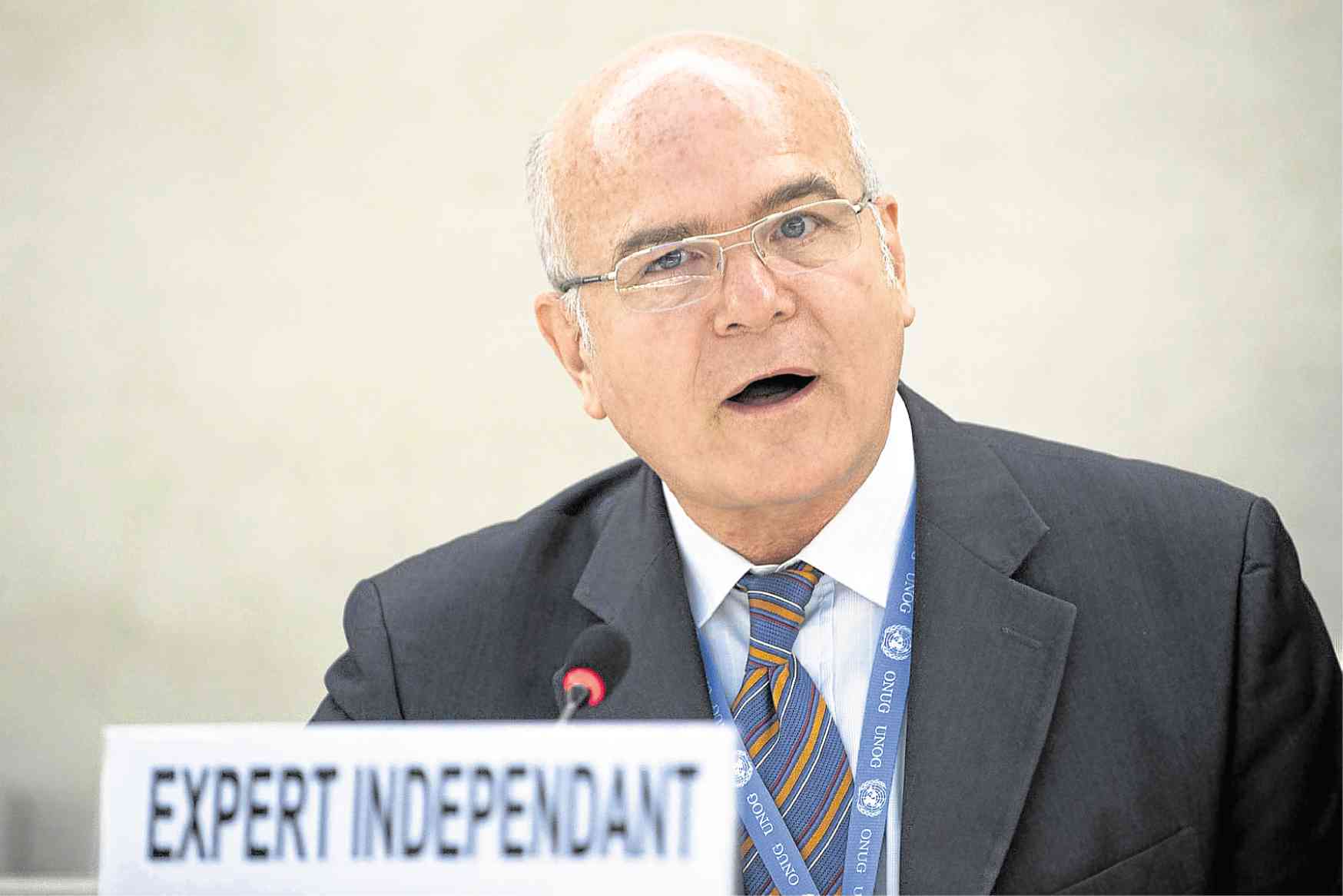
Michel Forst —UN PHOTO
Malacañang on Thursday railed against a United Nations special rapporteur for calling on the Duterte administration to stop attacks on human rights defenders.
Presidential spokesperson Salvador Panelo said the call of Michel Forst, UN special rapporteur on the situation of human rights defenders, was reckless and irresponsible.
The administration is “fed up with this practice of using the [United Nations] as a platform to parrot baseless criticisms of local interest groups, who are supported by resentful politicians belonging to the opposition,” Panelo said in a statement.
World report
He said UN special rapporteurs “should be less gullible as this reinforces President Duterte’s contempt for them who have consistently manifested bias against the Philippines.”
Forst released on Wednesday a report on the situation of human rights defenders in 140 countries.
In the Philippines, he said, President Duterte’s war on drugs has created a climate of insecurity and impunity for extrajudicial killings, affecting human rights advocates.
He said the Philippine government should “end immediately all forms of violations against human rights defenders, including extrajudicial killings and enforced disappearances.”
“The stigmatization, defamation, judicial harassment, arbitrary arrest and criminalization of (human rights) defenders is a key area of concern,” Forst said.
He reported that in the Philippines, human rights workers were vilified publicly, “subject to smear campaigns and online harassment,” and government officials had tried to link them to the illegal drug trade, as well as communist or terrorist groups.
Female rights workers
“Additionally, human rights defenders have been subject to arbitrary arrest and prosecution, including over trumped-up charges. Human rights defenders and political dissidents also report some form of surveillance by law enforcement personnel,” he said.
Forst mentioned the risks faced by female human rights workers and how these were related to the “promotion and reinforcement of misogynistic and heteropatriarchal norms.”
He said public stigmatization of human rights defenders could lead to attacks against them, and called for an end to this as well.
Forst said that while there may be legal means to fight against these issues under the Constitution, the impartiality of the Philippines’ judicial system had come into question, citing the case of ousted Chief Justice Maria Lourdes Sereno.
Sereno was removed from office in May not through impeachment by Congress as prescribed by the Constitution but by a challenge to her holding office brought by the solicitor general, which her colleagues on the Supreme Court granted.
Sereno had drawn the ire of Mr. Duterte for asserting the authority of the judiciary over judges that the President had linked to the illegal drug trade.
Panelo questioned the factual basis of Forst’s report, saying the “so-called human rights defenders never had it so good under the Duterte administration.”
“They continue to fully exercise all their rights to air issues and concerns related to their advocacies in an environment that is free and secure from any threat or harassment,” Panelo said.
File charges
He dared local interest groups, whom he accused of feeding Forst false information, to file charges with the interagency committee formed in 2012 to handle cases of extralegal killings, enforced disappearances, torture and other violations of human rights.
But Bayan Muna Rep. Carlos Zarate called on the Duterte administration to heed Forst’s call and recognize the importance of the work of human rights defenders.
“The report shows the real human rights situation in the Philippines and the dangers human rights defenders face because of the policies and pronouncements of the Duterte administration,” Zarate said in a statement.
Mr. Duterte has poured scorn on the United Nations and Western governments and parliaments for urging an end to killings in his brutal war on drugs.
He withdrew the Philippines from the treaty that established the International Criminal Court after the tribunal opened a preliminary examination of information brought against him due to the thousands of deaths in the drug war.
The crackdown has taken the lives of 5,050 people between July 2016 and November this year, according to the Philippine Drug Enforcement Agency.
Human rights groups and campaigners give varying estimates of the number of victims, from 12,000 to 20,000.
Last week, Chito Gascon, chair of the Commission on Human Rights, told The Guardian newspaper of London that the toll could be as high as 27,000.
Gascon said, however, that investigating the deaths was complicated because police withheld records of operations against drugs. —With a report from Jerome Aning